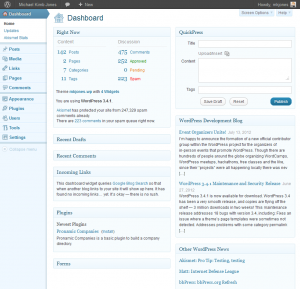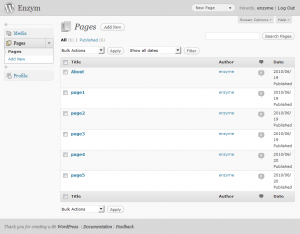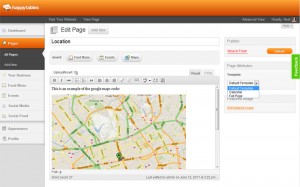A tweet CMS peaked my interested today:
Why can’t WordPress be as simple as ExpressionEngine?
— Alex Clarke (@DrAlexPClarke) July 20, 2012
It’s a solid argument. You see the more WordPress has matured and grown, the more complex it has become. In fact, it’s my opinion that the default WordPress admin screen is a pretty scary sight for newbies and is becoming increasingly more difficult to navigate:
Throw in a few plugins and custom post types into the mix and it can get even more mystifying.
The price for free
That’s the great thing about ExpressionEngine and some other paid-for/closed-source or smaller CMS tools. They can be built from a vanilla platform for a specific purpose with zero bloat and any extra functions can be hidden away from the user because they aren’t enabled.
WordPress however is different. Its key selling point is that it works out-of-the box and you can get publishing your information in under 5 minutes. It holds this end of the bargain pretty well (give it a try) but there is a pay-off in the learning curve involved and the potential cost of getting a developer to come in and make things ‘right’ for your project.
Making things right
Weirdly this ‘making things right’ approach often involves removing functionality from WordPress. Take for example the Simple CMS plugin which turns WordPress into a simple page-driven content platform perfect for basic websites:
Another great example is the work done by the happytables crew to make WordPress as easy as possible for restaurant owners to manage their own websites:
Eye of the WordPresser
So it’s true – WordPress may not be the simple-to-use tool that it was back in version 2.5, but that’s OK because it’s free, can be easily modified by developers and has a great community behind it.
As for ExpressionEngine, it’s a great CMS – is it easier to use? Maybe. Is it better than WordPres all-round? Probably not, but I’m bias.



#SYEE?
I think post-Tumblr, “its free” isn’t good enough. I’d say WP is easier for users than it is for devs, however.